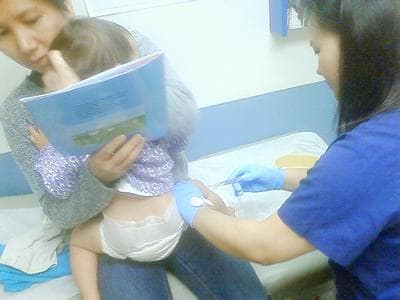Advertisement
The Persistence of The Anti-Vaccine Movement

In the face of massive evidence to the contrary, many parents continue to believe that vaccines cause autism. This, after numerous studies have shown no connection, and most recently, the research that launched the current anti-vaccine movement has been thoroughly discredited in the British Medical Journal amidst charges of fraud and financial shenanigans by its proponents.
So why do about one in 5 Americans still see a connection, wonders Michael Willrich, an associate professor of history at Brandeis, in an op-ed in The New York Times today?
Willrich makes the point that fear, even paranoia, toward vaccines aren't new:
Vaccines have had to fight against public skepticism from the beginning. In 1802, after Edward Jenner published his first results claiming that scratching cowpox pus into the arms of healthy children could protect them against smallpox, a political cartoon appeared showing newly vaccinated people with hooves and horns.
Part of the problem, Willrich says, is that rather arrogant government officials pushed public health on the public without proper education or "buy-in":
In America, popular opposition peaked during the smallpox epidemic at the turn of the 20th century. Health officials ordered vaccinations in public schools, in factories and on the nation’s railroads; club-wielding New York City policemen enforced vaccinations in crowded immigrant tenements, while Texas Rangers and the United States Cavalry provided muscle for vaccinators along the Mexican border.
Public resistance was immediate, from riots and school strikes to lobbying and a groundswell of litigation that eventually reached the Supreme Court. Newspapers, notably this one, dismissed antivaccinationists as “benighted and deranged” and “hopeless cranks.”
But the opposition reflected complex attitudes toward medicine and the government. Many African-Americans, long neglected or mistreated by the white medical profession, doubted the vaccinators’ motives. Christian Scientists protested the laws as an assault on religious liberty. And workers feared, with good reason, that vaccines would inflame their arms and cost them several days’ wages.
The backlash actually did some good, forcing new consumer protections and standards on the emerging vaccine industry. But in the end, Willrich says, public health officials should do a better job of explaining their good intentions, rather than continue to fret and fight the die-hard anti-vacciners.
America’s public health leaders need to do the same, to reclaim the town square with a candid national conversation about the real risks of vaccines, which are minuscule compared with their benefits. Why waste another breath vilifying the antivaccination minority when steps can be taken to expand the pro-vaccine majority?
This program aired on January 21, 2011. The audio for this program is not available.
